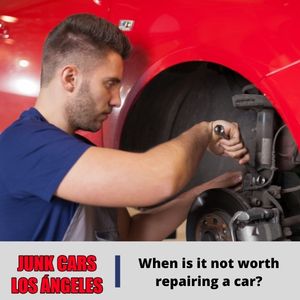It’s a given that cars require occasional repairs. But what if those repairs cost more than the car is worth? What if they’re so expensive that they would be better spent on a new car altogether?
Sometimes, the cost of repairing a car is more than the car is worth.
Other times, the repair would take so long that the car would be out of commission for a significant amount of time.
And sometimes, the repair would not be guaranteed to fix the problem with the car.
In cases like these, it may be best to simply walk away from the old car and buy a new one.
Additionally, if the car is too old or has too many miles on it, then it might be time to say goodbye to it.
 Do older cars need more repairs?
Do older cars need more repairs?
Yes , they do. Older cars definitely need more repairs than newer cars.
This is because the older cars have been on the road for longer and have had more time to experience wear and tear.
Parts on an older car are also more likely to break down since they have been used for a longer period of time.
Older cars may require more repairs, but this isn’t always the case.
Many factors go into how often a car needs repairs, such as the make and model of the car, the age and mileage of the car, and how well it’s been taken care of.
That said, some repairs are simply pointless. For example, a car may need a new engine or a new transmission. In these cases, the cost of the repair can exceed 50% of the car’s value.
Another factor to consider is the age and mileage of the car. If a car is older, it is likely to need more repairs.
This is because it has been on the road longer and therefore has accumulated more miles.
Similarly, cars that have high mileage are also more likely to need repairs. This is because parts have worn out over time and have therefore become less reliable.
In some cases, it may not be worthwhile to repair a car with high mileage, as the cost of the repair may exceed the value of the car itself.
How do you know if your car repair is worth it?
If an automobile “isn’t worth repairing,” it simply indicates that restoring it isn’t the best alternative. It occurs when a part of your automobile, usually an older one, breaks or is involved in an accident.
You’ll take it to a repair shop, where they’ll offer you an estimate to fix it.
They may even suggest that the automobile isn’t worth repairing, but the final choice is yours.
If your automobile is running well and there are no major concerns, this isn’t anything you need to be concerned about just yet. You could come across it again in the future, or you might not.
When it comes to car repairs, there can be a lot of uncertainty about whether or not the repair is worth it.
There are a few factors to consider when making this decision.
1. Obtain a Repair Estimate
If you don’t have a repair quote, you won’t know how much you’re going to spend. You should get two or three quotations from various stores simply to be sure the figure is correct.
The estimate should include all expenses related to restoring your automobile and correcting whatever damage caused it to break in the first place.
Make certain that the store provides you with a complete quote so that you can make the best option.
2. Calculate:
You’ll now need to conduct some math using your present vehicle.
Don’t worry if you’re not a math fan. This is what should do:
- If you own the automobile outright, use KBB’s “My Car’s Worth” tool to get its Blue Book value.
- If you’re making payments, figure out your monthly payment, how much of the automobile you own, how much the car is worth, and how much you owe. You’ll need to collect a lot of numbers, but that’s the only way to achieve it.
3. Compare the quotes:
So now you must compare the results of steps 1 and 2.
The part that follows will go through exactly what you’re searching for. The short answer is no.
If the number from step 1 is greater than the number from step 2, it is unlikely that it is worth fixing.
Some people mistakenly believe that in a situation like this, there are only two possibilities.
The first is to repair their automobile and drive it for the rest of their lives, and the second is to buy the greatest car on the market.
If the math says “no,” consider downgrading. Instead of buying a brand-new Lexus, consider older models or fewer luxury choices.
Downsizing your vehicle purchase might save you tens of thousands of dollars.
4. Think about your priorities.
While personal-finance specialists would normally encourage you to keep your automobile for as long as possible, money isn’t the only factor to consider.
Are you concerned that your vehicle may break down and leave you stranded? Is it conceivable that you may lose your work as a result of your unpredictable transportation? Is your automobile dangerous? Or do you simply despise looking at it?
While you should not let your emotions influence your decision to fix or replace your automobile, you should also not ignore them.
Life is too short to always be stressed out about your automobile.
At what mileage do cars start to have problems?
Cars start to have problems at various mileage points, depending on the make and model of the car. However, cars start to experience more problems at higher mileage levels.
Cars start to have problems at different mileages, depending on the make and model of the car. Some cars start to have problems at 50,000 miles, while others don’t start having problems until they reach 100,000 miles.
It’s important to keep track of your car’s mileage and be prepared for the repairs that will likely come up as it ages. This is because the older the car gets, the more problems it will experience.
Additionally, the cost of repairs tends to go up as the car gets older. So, by keeping track of your car’s mileage, you can anticipate the repairs that will need to be done in the future.
How much should you spend on car repairs?
Car maintenance expenditures should be viewed as ongoing expenses, as your vehicle will require service every few months or so.
As a general guideline, we recommend setting aside at least $100 each month for auto maintenance (not including fuel or insurance).
An unanticipated repair will typically cost between $500 and $600.
Therefore, a fair rule of thumb is to set aside $1,200-$2,000 each year for repairs and upkeep.
Setting up a separate “auto savings” account and transferring $100-$200 to it each month is a fantastic approach to do this.
According to financial experts, you should not spend more than 35 percent of your yearly salary on the automobile itself and the expenditures associated with its purchase.
What happens if you can’t pay for your mechanics?
If you are unable to pay your car’s repair cost in full, you can ask the auto repair business if you can make payments toward it instead.
However, if you haven’t paid the bill in 30 days, technicians have the legal authority to place a “mechanic’s lien” on your automobile.
Paying for auto repairs may be a hassle, especially if you don’t have the money to do so.
Let’s face it: hardly everyone has money set up for a rainy day when their automobile needs a new timing belt or anything even more serious.
In such a situation, you could find yourself panicking at the vehicle repair shop counter, rummaging through your wallet to figure out how to pay them.
What are your choices if you are unable to pay for car repairs?
-
Only complete a part of the work.
If any repairs are advised by the car repair business, you can ask them to delay the repairs by just having the most important work done right away.
As long as your car is functioning properly, you may be able to get the remaining repairs done at a later date.
-
Offer to pay the repair fee in installments.
If you are unable to pay your car’s repair cost in full, you can ask the auto repair business if you can make payments toward it instead.
However, if you haven’t paid the bill in 30 days, technicians have the legal authority to place a “mechanic’s lien” on your automobile.
This implies that your vehicle will remain at the auto repair shop until the amount is fully paid.
-
Consider doing some repairs on your own.
So, what if you want to fix your automobile but the math looks bad?
If you find your way around a car (or my blog or YouTube), you can make a lot of repairs on your own for a lot less money.
The fact that a technician may charge such a high price for an oil change is only the tip of the iceberg.
You may discover that a $1,000 repair can be completed on your own for $100 and a weekend’s worth of your effort.
However, this can be a difficult task, especially if you don’t have any experience repairing cars.
It’s important to remember that you can cause more damage by trying to fix the car yourself than by hiring a professional.
In the end, if you can’t pay for your mechanics, there are a few options you can consider.
Find a cheaper mechanic or do the repairs yourself. However, not everyone is comfortable doing their repairs.
If that’s the case, you may want to consider selling the car.
Where can you sell your car with mechanical problems?
If you’re looking to sell a car with mechanical problems, your best option is a junkyard.
Figure out a junking firm that will pay you for the automobile and truck it away for free, just so you come out on top.
Junkyards are businesses that buy cars that are no longer usable. They are interested in buying cars no matter their conditions.
Additionally, junkyards will usually take care of all the paperwork.
In Junk Cars Los Angeles, we specialize in buying automobiles in less-than-perfect condition, whether they are running or not.
We will provide you with the best, guaranteed offer for your vehicle based on its specifications and location, regardless of its condition.
Don’t try to fix it. It should be sold. Sell your automobile to us to make the most of your time and money.
Know the worth of your automobile just calling us and sell it right away.
How to sell a car that needs repairs?
Don’t you have enough money or time to fix all of your car’s damage? Sell it for cash to get rid of it! Even if it is difficult, selling it may be a big relief.
And we’re here to make things as simple as possible.
If you want to sell your old automobile for a decent price, regardless of its external or interior condition, model, or age, it doesn’t even matter if it crashed!
We promise the greatest service and customer service to purchase your automobile with cash as promptly and securely as possible at Junk Cars Los Angeles.
All you have to do is follow these easy steps:
-
1st step: Give us a call.
If you want to get rid of an old automobile, the first number to contact is 323-205-7761.
That’s the number for our junkyard, and we’d be delighted to assist you in getting rid of your automobile promptly and easily.
When we get your call, someone in the junkyard will answer it.
We are an open junkyard, so feel free to ask us anything regarding our experience, knowledge, and work. We would like you to be comfortable selling your automobile to us!
We’ll also answer any questions you have regarding selling your automobile, paying, and towing.
-
2nd step: Describe your vehicle.
A member of our team will ask you a few questions about your car or vehicle to give you a fair price for it.
We will ask you some of the following questions to get more information about your vehicle and so estimate the quote:
– What is the type and model of your car?
– What year is your vehicle?
– Is the automobile damaged, or are there any scrapes on the body panels?
– Do you have any other accessories, such as wheels, tires, rims, and so on?
– What is the mileage on the odometer?
– Is the automobile or truck in working order?
– Are there any large dents or scrapes in the paint or on the car’s body?
– Does the automobile or truck have any severe mechanical issues?
We always provide our customers with the greatest price for their vehicles, and we will collect your information and pick up time for free.
As a result, we must know the conditions and facts about your vehicle to compute as fairly and accurately as feasible.
-
3rd step: Schedule a pick-up time.
We can schedule your car’s pick-up when we provide you with an estimate.
We have a team of skilled drivers who will pick up your automobile and transport it to our junkyard.
We provide same-day service, which allows you to get rid of your automobile promptly and securely.
Please let us know which time works best for you. We don’t want to be bothersome or inconvenient since we appreciate and cherish your time.
Our junk vehicle buyers use a simple procedure that allows you to sell your car or truck immediately and effectively.
-
4th step: Do some paperwork.
When our tow truck arrives at your location, our courteous employees will have some papers to fill out.
This paperwork is required to complete the deal and guarantee that both the buyer and seller are happy with the purchase.
This is a quick procedure; the forms are simple, and you will receive all of the support you need.
You will be provided a salvage bill of sale after the process is done.
Pros to selling your vehicle that needs repairs.
There are many positive reasons when selling your car that needs repairs to a junkyard.
- Many replacement vehicles will have warranties and pre-purchase maintenance.
- Innovative technology/fun features
- Your replacement vehicle will most likely be more dependable.
- Consider how much time you’ll save if you don’t have to take it to the mechanic all the time.
- Fewer expenses and less waste of time.
- No worries or stress.
- Get cash for a car that doesn’t work.
In conclusion, there are several factors to consider when deciding whether or not to repair a car. The most important factor is usually the cost of the repairs, which may be more than the value of the car itself.
Additionally, if the time it takes to get the repairs done would mean that you are without your car for an extended period, you may want to consider other options such as selling your car.
We are a reliable junkyard and a very easy process to buy your car for cash. Stop wasting your money on repairs and visits to the mechanic, contact us!

